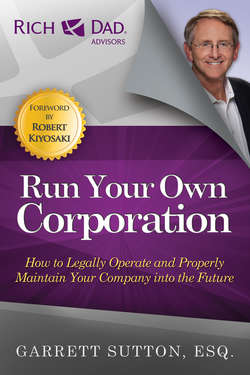Читать книгу Run Your Own Corporation - Garrett Sutton - Страница 16
На сайте Литреса книга снята с продажи.
Sole Proprietorship
ОглавлениеEach entity choice has its pros and cons. There is no one-size-fits-all corporate entity that will be the best for every situation. (And beware of the advisor who tells you there is.) However, there is one entity that we call the bad entity. It is the Sole Proprietorship. One lawsuit and (as in the case of Righteous Rock) you can lose all of your assets, meaning both your business and personal assets. The sole proprietorship offers no asset protection. It is not an entity in the true sense of the word because there is no separateness. You don’t file for a charter with your state, and thus there is no separate corporate legal identity. It is just you, doing business without any protection.
Why anyone would use it is simple: Because they do not bother to make a true decision about corporate structure. If you never choose a corporate entity but start up a business anyway, you are a sole proprietor. You are your business and your business is you. Making a bad decision or, in some cases, no decision can end up costing you not only your business assets but your personal assets as well.
There is no entity easier to set up than a sole proprietorship. You can easily set it up on your own because there is not that much to do. Once you start operating you will mostly forget about it. (Until you get sued and realize they can get everything you own.) You can run the business under your own name, if you choose, or apply for a fictitious name or a DBA (Doing Business As) at your county clerk’s office. With a sole proprietorship, there are really no prerequisites for starting up, no amount of startup cash to be accumulated, no filings with the state, no bylaws or articles of incorporation. However, again, it is also the entity that exposes you and your business to the most risk.
The only official steps you have to take to start a sole proprietorship is obtain a business license with your municipal and state agencies, obtain an occupancy permit for your place of business (if you’re not running e-commerce or working out of your home), and/or apply for a franchise certificate if you’re opening a franchise. And that’s it. You’re not even required to open a separate bank account for the business.
At the end of the year, your business activities are included on your personal tax return. There can only be one owner in a sole proprietorship. If you are going to have partners you can’t operate as a sole proprietorship (which removed it from Alana and Sherri’s list of choices).
A sole proprietorship can be set up almost instantly. It can also get you into trouble almost instantly. With a sole proprietorship, you are your business, which means that if a creditor sues your business, that creditor sues you, and you’re liable. When you set up your business as a sole proprietor, you put your house, your bank account, your car and all your assets on the line.
Quick and easy isn’t always the best way.
